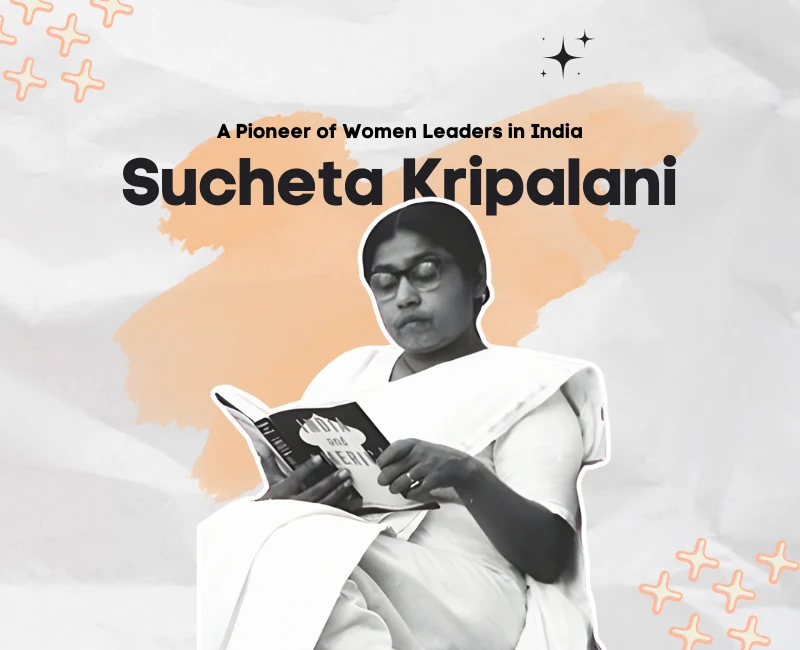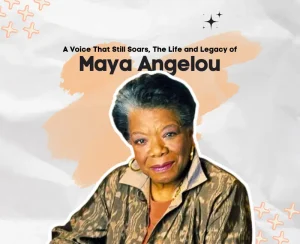Sucheta Kripalani: A Pioneer of Women Leaders in India

India is a land of rich culture and history, a nation that fought hard for freedom and rose from the dust to become one of the leading countries in the world. Countless people gave their undivided devotion to this struggle, many of them remembered as unsung warriors. Among this rare group of men and women, Sucheta Kripalani shines as one of the rarest gems. She is the India’s first woman Chief Minister, a pioneer of women leaders in India.
Sucheta Kripalani story isn’t about being the “first”, it represents the courage, discipline, and a commitment to service that never wavered. She led protests during the Quit India Movement while managing complex politics of Uttar Pradesh. Her life tells a tale of breaking barriers, a tale of courage and conviction.
Early Life and Education
Sucheta Kripalani was born on 25 June 1908 in Ambala, a city that was then part of the Punjab province under British rule. She grew up in a Bengali Brahmo family where discipline, education, and values were given high importance. Her father, Surendranath Majumdar, worked as a medical officer, a role that required frequent transfers across cities. As a result, Sucheta attended multiple schools during her childhood, an experience that exposed her to diverse environments and shaped her adaptability from an early age.
She pursued her undergraduate studies at Indraprastha College for Women, Delhi. Then went on to complete her master’s degree in history from St. Stephen’s College, Delhi. She later recounts in her unfinished autobiography that growing up she was shy and self-conscious. After completing her education, Sucheta began her professional career as a professor of Constitutional History at Banaras Hindu University.
In 1936, she married J. B. Kripalani, a senior leader of the Indian National Congress, twenty years her senior. Their union was unconventional and faced opposition from both families as well as Mahatma Gandhi, though he eventually gave his approval.
Role in India’s Fight for Freedom
From a bright student to a freedom fighter, Sucheta’s life is an inspiring journey. In the 1930s and 1940s, India’s struggle for freedom intensified and she inspired by ideals of Mahatma Gandhi joined the march to freedom.
She actively participated in the Quit India Movement of 1942. She played a key role in mobilizing women to participate in protests, organize local resistance, and spread awareness about India’s demand for freedom. She accompanied Mahatma Gandhi to Noakhali in 1946. A communal riot erupted in Noakhali (now in Bangladesh) in October 1946, Gandhi ji with several other associate organized a peace mission to bring communal harmony. She was not deterred by the dangers which included being arrested and jailed. The events of these tumultuous years not only made her even more determined but also prepared her perception to understand leadership and justice and the value of peaceful intervention in a time of crisis. The role of Sucheta Kripalani in the Independence struggle of India is a perfect example of her intense loyalty, her fearless nature and her determination to do right in times of great personal risk.
Contribution to the Indian Constitution
Sucheta Kripalani was an active participant in India’s journey to freedom. Her contribution to drafting the constitution is noteworthy. In 1946, she was elected to the Constituent Assembly of India, a group of intellect people that were responsible for drafting the country’s Constitution. As a member, she participated in debates and committees that shaped India’s democratic framework, ensuring the voices of women and marginalized communities were represented.
She also helped in strengthening the Indian National Congress and encouraging women’s participation in politics. Although her contribution to drafting the constitution is overshadowed by many prominent figures yet, her principles are woven into the fabric of the nation.
Political Journey
Sucheta has an impressive political trajectory. She was among the first women parliamentarians in independent India, breaking barriers at both the state and national levels. She served as a Member of the Uttar Pradesh Legislative Assembly from 1943 to 1950, and then as a member of the Provincial Parliament (UP) from 1950 to 1952. Her leadership skills and commitment to public service were further recognized when she was elected to the First Lok Sabha (1952–1957) and the Second Lok Sabha (1957–1962).
During this period, Sucheta also held ministerial roles in Uttar Pradesh, serving as Minister of Labour, Community Development, and Industry from 1960 to 1963. After that she was elected as the chief minister of Uttar Pradesh.
How Sucheta Kripalani made History?
The path to power for Sucheta Kripalani was as unconventional as it was historic. In the last week of September 1963, the Congress leadership was considering potential successors to Chandra Bhanu Gupta, who had resigned as the Chief Minister of Uttar Pradesh under the Kamaraj Plan. At that time, Gupta was in Delhi visiting his ailing friend J. B. Kripalani, Sucheta’s husband, while Sucheta herself was also in Delhi, taking care of her husband.
In a lighter moment during the visit, J. B. Kripalani suggested to Gupta, “Why don’t you give the CM’s post to her?” The idea appealed to Gupta, who later recommended to Prime Minister Nehru that Sucheta Kripalani be considered for the leadership of the Congress Legislative Party (CLP), overlooking other contenders like Kamalapati Tripathi. Sucheta later recalled that while her husband was hospitalized at Willingdon Hospital (now Dr. Ram Manohar Lohia Hospital), K. C. Pant, son of G. B. Pant, informed her that her name was being seriously considered as Gupta’s successor.
The final decision rested with a meeting of the CLP in Lucknow, where party MLAs were given blank papers to write down the leader of their choice. Only two names were in contention: Sucheta Kripalani and Kamalapati Tripathi. When the votes were counted, Sucheta emerged victorious by a margin of 99 votes. On 2 October 1963, she was sworn in as the fourth Chief Minister of Uttar Pradesh, making history as India’s first female Chief Minister.
Leadership as a Chief Minister
Although Sucheta Kripalani’s tenure lasted about 3 years and 5 months, from 2 October 1963 to 13 March 1967, her leadership left an impression. She initiated several noteworthy measures that reflected her concern for education, social justice, and governance.
She waived school fees for all girls up to Class 10 from January 1965 in UP. Her government also established Meerut University (now Chaudhary Charan Singh University) and Kanpur University (now Chhatrapati Shahu Ji Maharaj University), expanding higher education opportunities in the state. Her government also increased reservations in Group C government jobs to 24 per cent and in Group D to 45 per cent until targets were met. Additionally, a Sainik School was set up in Ghorakhal, a new medical college in Meerut was started, and the UP Awas Vikas Parishad was established to promote housing development.
She was a strict, yet simple person and she demanded transparency and accountability in governance. Her administration made some efforts to curb corruption and increase law enforcement as well as addressing burning social needs. She herself took charge in the fight against dacoits in the Chambal valley through the police radio unit and this role proved that being a leader is not just about talking a good game, it also requires courage, and it means rolling up the sleeves to get the job done.
Other Contributions and Later Political Career
Even after stepping down as Chief Minister in 1967, Sucheta continued to serve the nation with dedication, and her contributions were truly multidimensional. She remained active in Parliament, representing Uttar Pradesh in the Lok Sabha. She worked on social welfare, women’s empowerment, and rural development. She devoted her commitment to humanitarian and relief work.
She was involved in several relief activities throughout her life, including aiding victims of the 1934 Bihar earthquake, the pre-Partition riots in Noakhali in 1946, the rehabilitation of Tibetan refugees in 1959, including the Dalai Lama, and aiding East Pakistan refugees during the Indo-Pak War of 1971.
Her dedication to women’s empowerment was pioneering. She founded the All India Mahila Congress, the women’s wing of the Indian National Congress, and worked tirelessly to create opportunities for women in politics, education, and public life. Her early life and partnership with J. B. Kripalani also influenced her political path. Both were committed freedom fighters and social workers, even though their political journeys eventually took them into different parties. Sucheta had already been active in the independence movement before her marriage, teaching Constitutional History at Banaras Hindu University and organizing women for political action. During the Quit India Movement, she went underground to evade arrest but was eventually imprisoned in Patna and Lucknow, exemplifying her courage and dedication to the cause of freedom.
A Glimpse into Her Autobiography
A story of courage, dedication, and unwavering patriotism, Sucheta Kripalani was a trailblazer. In her unfinished autobiography we get a glimpse of how she wants the nation to remember her. She recounts how she was a shy and self-conscious child growing up. How she was drawn towards public service and the inspiration behind her political career.
After the ghastly incident of Jallianwala Bagh massacre, the 10-year-old Sucheta decided to fight for freedom and justice. These memories, along with her exposure to the nationalist movement during her college years, inspired her commitment to the freedom struggle. In her book she shares candid reflections on her marriage with J. B. Kripalani, acknowledging both the challenges and the shared ideals that sustained their partnership. She also offers insights into her political journey, detailing the obstacles she faced as a woman in a male-dominated world, the arrests during the Quit India Movement, and the complex dynamics of governance in Uttar Pradesh.
She wrote ““I was keen to start political work. I used to feel small before the veteran jail-goers, as I had not graduated from jail life. Kripalani wanted me to do any work of my choice, not necessarily politics. Early in life, his advice to me was ‘Apna daman saf rakhna,’”. She even recounts how her and her husband’s political loyalties sometimes lay in different directions, yet they never questioned or undermined each other. Her reflections in her autobiography reveal a woman deeply aware of her responsibilities yet grounded in humility and principle.
Philosophy and Reflections
Sucheta Kripalani’s life was guided by a simple yet powerful philosophy: lead with integrity, serve with dedication, and act with courage. She contributed her life to the welfare of people. She was a freedom fighter, parliamentarian, and Chief Minister were rooted in this principle. In her autobiography, she reflects on the challenges she faced as a woman in politics, noting that perseverance and self-belief were more important than societal approval. She often emphasized that fear and hesitation could not guide a leader; only conviction and clarity of purpose could.
Sucheta also spoke about the importance of balancing personal values with public duties. Even when her political paths diverged from her husband J. B. Kripalani, their mutual respect and understanding never wavered. This demonstrates her belief that principles and relationships can coexist, and that true leadership involves compassion, patience, and moral integrity. In her words, leadership is about action, responsibility, and leaving a positive mark on society.
She contributed on many reliefs works, advocated for women, and put her efforts to uplift the underprivileged. Sucheta Kripalani’s story continues to inspire modern India. She was an inspiration for many women political leader still facing the stigma of male-dominated society. By remembering Sucheta Kripalani, we celebrate not only her historic achievements but also the values she embodied.
Conclusion
Sucheta Kripalani’s life is a testament to courage, discipline, and unwavering commitment to service. From being a shy girl, she grew up to become an ideal woman who stood at the forefront of building a strong nation. Her contributions were noteworthy and should be remembered as a guiding light for future generations, inspiring women to step into leadership roles and reminding all citizens that dedication, integrity, and moral courage are the true measures of impact. By remembering her, we honor a legacy that continues to inspire future generations to serve with courage, fairness, and unwavering commitment to the nation.


